Every Season Of Dexter Ranked Worst To Best
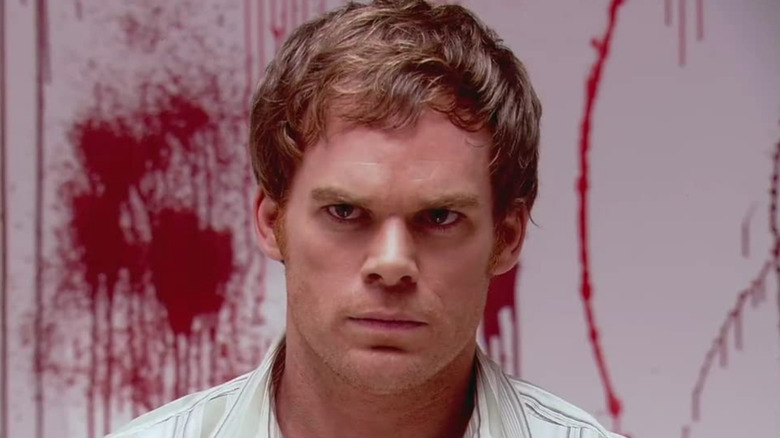
Showtime's "Dexter" made a name for itself by combining police procedurals and America's obsession with true crime. Adapted from Jeff Lindsay's novel "Darkly Dreaming Dexter," the scripted drama featured a new kind of monster, the psychopath with a heart of gold. Dexter Morgan is a blood-spatter analyst for the Miami Metro Police Department by day and a serial killer by night. Governed by a strict ethical code created by his adopted father Harry, Dexter (mostly) only kills other murderers intending to close the gaps left by a fallible legal system. The show's success is largely due to the stellar performance of Michael C. Hall, who manages to evoke sympathy from the audience while portraying Dexter's inability to feel human emotions.
"Dexter" was an immediate hit for Showtime with its first season finale becoming the highest-rated original programming in the premium channel's history. This popularity expanded when an edited version aired on CBS during the 2007-2008 writers' strike, bringing the complicated antihero to network TV. Though the series continued to earn high ratings, critical acclaim, and award nominations throughout its original eight-season run, "Dexter" suffered from wildly uneven writing, providing some of television's most acclaimed and derided story arcs. Due to nearly universal disdain for the show's now-infamous series finale, former showrunner Clyde Phillips collaborated with Hall for a revival hoping to provide a more satisfying ending. "Dexter: New Blood" received mostly positive reviews, but how does it stack up against the other eight seasons? Let's answer this question by ranking each season of "Dexter" from worst to best.
Season 8
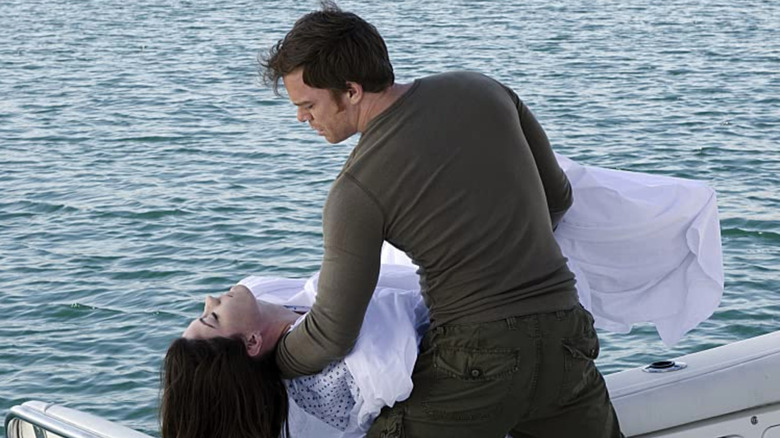
While not all bad, the final season suffers from missed opportunities and has one of the most hated series finales of all time. Early episodes are dominated by Deb's grief and anger after killing Lt. LaGuerta to protect her brother. She's resigned from Miami Metro PD and is in a darker emotional state than ever before. Meanwhile, Dexter finds a mother figure in Dr. Evelyn Vogel, the neuropsychiatrist responsible for developing Harry's code, and a possible apprentice in a young psychopath named Zach Hamilton. But these promising characters are tossed aside in favor of the Brain Surgeon, a lackluster serial killer too similar to the big bads of previous seasons.
The return of Dexter's true love, Hannah McKay, is a welcome development that sours when Dexter sends her and his young son Harrison down to Buenos Aires with no intention of joining them. He fakes his death by driving his boat into the eye of a hurricane and then reemerges as a lumberjack in the Pacific Northwest. This frustrating conclusion lets Dexter off the hook for eight seasons of destruction while leaving everyone around him to pick up the pieces. Deb's tragic fate only adds insult to injury. While recovering from a gunshot wound, she suffers a stroke that leaves her brain dead and on life support indefinitely. The image of Dexter dumping her lifeless body into the stormy ocean along with his other victims is a heartbreaking end for a beloved character who's been put through the wringer for years, partly due to her brother's violent secret.
Season 6
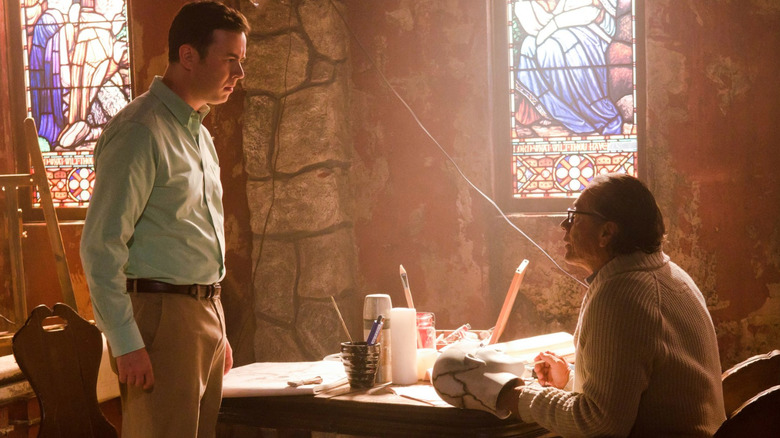
Season 6 takes a big swing with its central villain The Doomsday Killer, a pair of religious zealots who attempt to bring about the apocalyptic End of Days. Inspired by the book of Revelations, biblical scholar Professor James Gellar and his student Travis Marshall create a series of gruesome tableaus designed to reflect the sins of Miami's citizens. While Colin Hanks makes for an unexpected villain, the reveal that he killed Gellar long ago and is the sole mastermind behind the crimes presents implausibilities too big to ignore. Dexter's initial assumption that Brother Sam is a killer plays into uncomfortable racial stereotypes, and the idea of Dexter as an Antichrist figure, complete with a preposterous mural, borders on silly.
Equally frustrating are several romantic entanglements that complicate the lives of the supporting cast. Batista and LaGuerta divorce, leaving an awkward situation for all of their coworkers, and Deb rejects Quinn's marriage proposal, ending a relationship that finally seemed to make her happy. In therapy, she begins to explore romantic feelings for her adopted brother Dexter, a cringe-worthy development considering the five previous seasons of strong sibling love. Though Jennifer Carpenter and Michael C. Hall were briefly married in real life, the on-screen romance feels icky and cheap, unnecessarily muddling the show's strongest relationship. Its only redeeming quality is in setting up one of the series' best cliffhangers: In the finale's final moments, Deb plans to confront Dexter with her feelings but winds up witnessing his ritualistic murder of Travis Marshall, finally revealing his true identity.
Season 7

Season 7 is a wild mix of convoluted storylines all revolving around romance, revenge, and death, some more successful than others. The season's big bad is Isaac Sirko, a Ukrainian mob boss who swears revenge on Dexter after he kills Sirko's lover in the first episode. Redeeming the season is the introduction of Hannah McKay, a beautiful murderer whom Dexter initially targets for his table, but winds up falling in love with. It's his first time in an adult relationship with someone who accepts him for who he truly is, but Dexter's devotion to his sister gets in the way. Hannah attempts to poison Deb to protect Dexter and he must once again choose between his sister's safety and an honest relationship.
Serving as a bridge between two massive cliffhangers, the penultimate season sees Deb attempt to reconcile the knowledge that her brother is a serial killer with her own ethical code. Her efforts to monitor and reform his murderous tendencies are exhausting, especially considering LaGuerta's renewed interest in the Bay Harbor Butcher case — a trail that leads her straight to Dexter. The devastating conclusion forces his already traumatized sister to choose between murdering a friend and saving her brother, a decision that will haunt her for the rest of her life. The season ultimately proves too messy, setting up complicated but forgettable plotlines while resurrecting long-dormant stories. It buckles under its own narrative weight and, despite a few jaw-dropping moments, proves too unwieldy to keep track of.
Season 5

The aftermath of Rita's death was always going to be tricky, but Season 5 recovers reasonably well with a revenge storyline centering on healing and catharsis. Early episodes see Dexter struggle with his own grief and guilt combined with the fact that he will never get to punish Trinity for killing Rita. It's a touching storyline that forces the previously emotionless psychopath to deal with his very real feelings. Less welcome is Quinn's suspicion that Dexter is somehow involved in Rita's death. He enlists Liddy, a disgraced cop with an ax to grind, to follow and investigate the new widower.
The season's heart lies with Lumen Pierce, a survivor of a brutal rape and murder ring Dexter stumbles upon while killing her attacker, Boyd Fowler. She is the 13th victim of the horrifying Barrel Girl Gang who enlists Dexter's help in tracking down and killing her attackers. After five seasons, Dexter finally gets a partner who accepts him for who he is and the two begin a relationship that provides both of them with much needed healing and support. The bittersweet conclusion allows Lumen to return to her previous life, leaving Dexter to wonder if true happiness will ever be available to him. Julia Stiles received an Emmy nomination for her portrayal of Lumen and remains a beloved guest star, one whom many fans had hoped to see in the revival.
If you or anyone you know has been a victim of sexual assault, help is available. Visit the Rape, Abuse & Incest National Network website or contact RAINN's National Helpline at 1-800-656-HOPE (4673).
Season 3
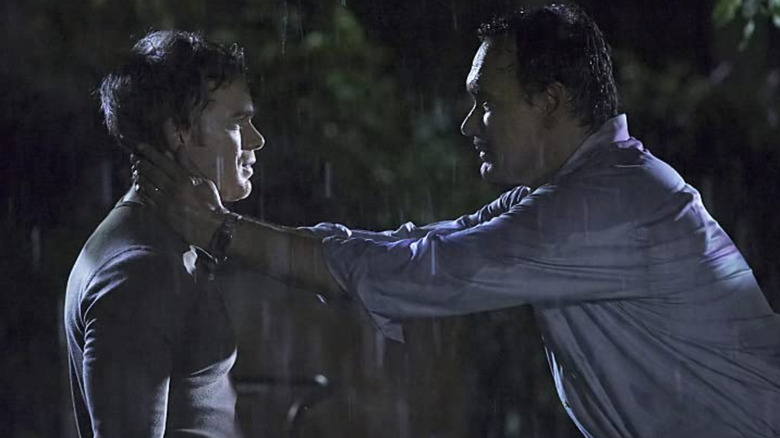
The season of The Skinner may not be a series high, but it features the Showtime series firing on all cylinders. Dexter has mastered his murderous craft and contemplates taking on an accomplice in Assistant District Attorney Miguel Prado, played by the magnetic Jimmy Smits. After accidentally killing Miguel's brother, Dexter assists in the investigation of his death and the two become close friends. They share a similar desire for vigilante justice and Dexter attempts to teach Miguel his code. But Miguel soon goes rogue, murdering a defense attorney with whom he's had an adversarial relationship and turning on his would-be mentor. He enlists the help of a sadistic serial killer known as The Skinner, and Dexter winds up on the wrong end of another killing table, barely escaping with his life and secret identity intact.
The season's overarching theme centers on trust and lasting partnerships as Deb finally finds a happy relationship with Anton, one of Quinn's informants. Dexter has romantic problems of his own when Rita discovers she's pregnant and the secret serial killer finds himself facing major life decisions. Rita has become more than just a convenient cover, and Dexter is faced with the juxtaposition of his feelings for her and the needs of his Dark Passenger. With a streamlined plot and two unnerving villains, Season 3 is a solid stretch of episodes and provides as close to a happy ending as Dexter and his friends ever really get.
Dexter: New Blood
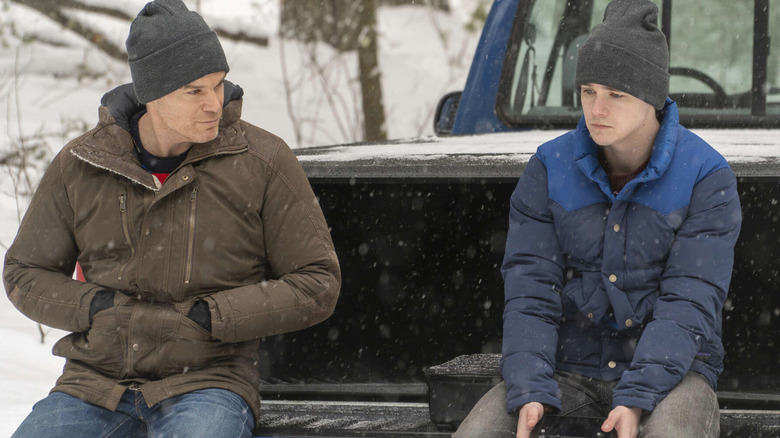
10 years after Dexter sailed into the eye of a hurricane, the vigilante killer reemerges as Jim Lindsay, a sporting goods salesman in the small town of Iron Lake, New York. But his past catches up with him as teenage son Harrison tracks him down, having found a letter from his long-lost father in the wake of Hannah's death. Dexter takes the boy in and finds some much-needed closure, sharing his pain with the only person in the world who can truly understand him. Realizing that Harrison has his own Dark Passenger stemming from the trauma of witnessing Rita's death, Dexter attempts to pass on Harry's code to a new generation. This coincides with Dexter's first kill in 10 years, and father and son square off against town patriarch Kurt Caldwell, who is hiding a dark secret of his own.
The revival was a major hit for Showtime, becoming the most-watched show in the network's history. Jennifer Carpenter reprised her role as Debra Morgan in a poignant turn as Dexter's new moral compass. Showrunner Clyde Phillips also returned, attempting to redeem the series with an ending Dexter deserves, one that proves the beloved serial killer has been his own big bad all along. The emotional climax confronts Dexter with all of the pain he's caused and finally reveals his true identity to the world. In the end, Dexter chooses a hopeful future for his son, free from the shadow of his father's violent past.
Season 2
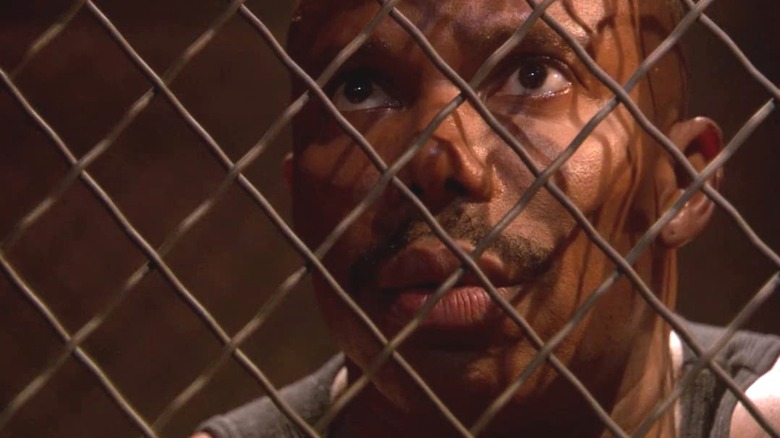
Season 2 sees the new Showtime drama hitting its stride, with its highest ratings to date and an Emmy nomination for Outstanding Drama Series. Refusing to rest on its antihero format, the opening episode flips the concept on its head, forcing Dexter to investigate his own crimes. With the discovery of his aquatic dumping ground, Miami Metro is consumed with the case of the Miami vigilante, dubbed the Bay Harbor Butcher. Deb begins a relationship with Frank Lundy, the much older head of a special task force brought in to track the newly discovered serial killer, while Dexter enjoys support from the community, some of whom welcome his brand of violent street justice.
The more complicated plot element involves Dexter's tumultuous affair with the chaotic Lila West, his sponsor in the NA program Dexter adopts as a new cover. Their relationship marks the first time Dexter reveals his true identity to another person, introducing an element of trust he will continue to chase for the rest of his life. But Lila grows too unstable and threatens the life of Rita and her children in an attempt to win back Dexter's affections. His Season 1 antagonist, Sgt. Doakes, also discovers his murderous secret and Dexter must choose between two pillars of Harry's instructions: "Don't get caught" and "never kill an innocent." Reeling from their breakup, Lila takes the decision out of his hands in an explosive act that makes her a more suitable fit for Harry's code.
Season 1

The season that started it all provides crucial insight into Dexter's past and allows audiences to connect with the cold-blooded killer. In a series of flashbacks, we not only see Dexter's first kill and the development of Harry's code, but also the horrific tragedy that spawned Dexter's dark desires. As a toddler, Dexter watched his mother brutally dismembered with a chainsaw and then sat in a shipping container filled with her blood for days. He was eventually rescued by Harry who would go on to adopt him and teach him to channel his trauma into vigilante justice. The pilot episode begins with Dexter killing a child predator, allowing us to immediately empathize with the murderous psychopath.
We also meet the lovably foul-mouthed Debra Morgan, Dexter's adopted sister. An officer in the MMPD, she's promoted to homicide due to her insight on the department's ongoing Ice Truck Killer case. This mysterious murderer kills and dismembers sex workers, draining their blood and displaying their bodies in formations that may hold secret messages to Dexter. The two killers develop a playful back and forth, admiring the other's gruesome handiwork and flirting with the possibility of joining forces. The Ice Truck Killer is finally revealed to be Brian Moser, Dexter's long-forgotten older brother who sat with him in that blood-filled shipping container as a child. Brain kidnaps Deb, forcing Dexter to choose between a blood relative who will accept him for who he is and the sister that allows him to hold onto his humanity.
Season 4

Season 4 picks up six months after Dexter's wedding to Rita and sees the new father struggling to balance the responsibilities of family life with the needs of his Dark Passenger. On the trail of a new killer, he takes inspiration from Arthur Mitchell, a prolific serial killer dubbed Trinity due to his habit of killing in cycles of three. This ritualistic pattern is intended to assuage the guilt Mitchell feels for his sister's long-ago death and replicate the subsequent destruction of his own family. Though he hides a dark secret, Mitchel is a well-respected member of the community and a father of two whom Dexter looks to as an example of how to hold it all together. But his well-cultivated persona hides a dark streak of domestic abuse and Arthur's family lives in terror of his violent outbursts and dangerous control.
The season is widely considered the high water mark of the series earning John Lithgow an Emmy Award for his portrayal as The Trinity Killer. Lithgow is terrifying as an abusive father, modeled after real-life serial killer the BTK, prompting New Yorker critic Emily Nussbaum to describe his performance as "so creepy I'm still not over it." The season's final moments are arguably the most memorable of the show's entire run as Dexter returns home to find Rita dead in the bathtub, Trinity's final victim. After the finale's premiere, Showrunner Clyde Phillips left the show to spend more time with his family setting a bar for quality "Dexter" was never again able to reach.
If you or someone you know is dealing with domestic abuse, you can call the National Domestic Violence Hotline at 1−800−799−7233. You can also find more information, resources, and support at their website.
Read this next: The 18 Best Crime Dramas In TV History
The post Every Season Of Dexter Ranked Worst To Best appeared first on /Film.